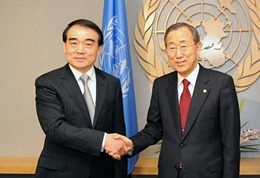 Contrary to some official U.S. reports of changing policy, China’s UN Representative and the head of China’s delegation to the NPT Review Conference Li Baodongreaffirmed China’s longstanding pledge not to be the first to use nuclear weapons “at any time under any circumstances” (in Chinese).Li’s statement was featured prominently on aspecial section on the NPT Review Conference on the Military Affairs section of the People’s Daily website (in Chinese).
Contrary to some official U.S. reports of changing policy, China’s UN Representative and the head of China’s delegation to the NPT Review Conference Li Baodongreaffirmed China’s longstanding pledge not to be the first to use nuclear weapons “at any time under any circumstances” (in Chinese).Li’s statement was featured prominently on aspecial section on the NPT Review Conference on the Military Affairs section of the People’s Daily website (in Chinese).
Li also signaled China’s willingness to participate in multilateral disarmament talks among all the nuclear weapons states “when conditions are mature.” The Obama’s administration’snew Nuclear Posture Review(NPR) called for “a dialogue on strategic stability to provide a venue and mechanism for each side to communicate its views about the other’s strategies, policies, and programs on nuclear weapons and other strategic capabilities.”
Recent U.S. assessments of China’s nuclear doctrine suggested China’s commitment to an unconditional no first use policy might be changing. The2009 Pentagon Report on Chinese Military Power, for example, claims that “PRC military writings suggest that additional missions for China’s nuclear forces include deterring conventional attacks against PRC nuclear assets or conventional attacks with WMD-like effects…” Obama’s NPR expressed concern about “lack of transparency surrounding [China’s] nuclear programs – their pace and scope, as well as the strategy and doctrine that guides them.”
李斌教授,一位物理学家在中国的我们apons labs, advised the Chinese delegation to the CTBT, and who now runs the arms control program at China’s Qinghua Universityrecently expresseda long-standing and widely felt Chinese frustration with U.S. attitudes towards discussions with China about their nuclear doctrine. “”On one hand, the Western experts tell us not to abandon no first use,” Li said. “On the other, they say it’s not credible. We can never win.”
Many of the Chinese experts taking part in dialogs with the United States are frustrated over U.S. reluctance to forgo the first use of nuclear weapons. China’s nuclear strategy relies on the presumption of a strong “nuclear taboo”: the belief that there is virtually no chance nuclear weapons will ever actually be used. The U.S. refusal to join China in an unconditional no-first-use pledge weakens that taboo. But what is even more frustrating to the Chinese who have participated in these bilateral dialogs on strategic stability is the way US experts talk about the first use of nuclear weapons. Li Bin put it this way in arecent article on U.S. – China strategic stability:
These discussions completely ignore the effect of the nuclear taboo, making casual suppositions about the use of nuclear weapons, for example, supposing nuclear nations, after defeat in a conventional conflict, must use nuclear weapons to reverse the war situation. During every form of nuclear dialog between China and the United States, American academics frequently engage in this type of “academic” persuasion with the Chinese side. The starting point is defending the U.S. refusal to make a no-first-use pledge, but this so-called academic propagandizing objectively weakens the confidence of Chinese scholars in the nuclear taboo.
In his reaffirmation of China’s unconditional NFU pledge at the UN, Li Baodong emphasized that the pledge shows that China’s nuclear doctrine is transparent, and many Chinese arms control analysts believe this makes their nuclear policy more transparent than the U.S., which still refuses to take the possible first use of nuclear weapons off the table.
The differences between the U.S. and China on what constitutes nuclear transparency are, in part, a consequence ofsignificant and often under-appreciated language and cultural differences. If the hoped-for bi-lateral dialogue on strategic stability is to succeed, the Obama administration may want to consider sending representatives who are more sensitive to these differences than their predecessors.
